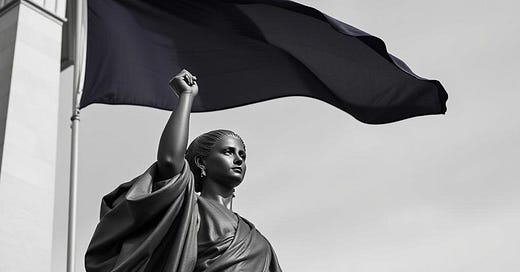From Reflections to Actions: Reimaging MLK Jr’s Legacy in Medicine and Beyond
Breaking the Cycle of Nostalgia: Turning MLK Day Into a Catalyst for Change Now
Martin Luther King Jr.'s legacy has shaped every facet of my life. From learning about his early days in the Northeast before becoming the Reverend to his pivotal role as a Civil Rights leader, his impact is undeniable.
His work in places like Selma, Alabama—a state deeply tied to my family’s lineage—stands as a testament to his courage and vision. Each January, I’m reminded of his profound contributions, but my commitment to honoring and respecting his work extends far beyond a single month.
It’s something I carry every day, whether I intend to or not.
Yet, every MLK Day feels like faith without action. I sit through lectures and attend events that focus on the past, offering reflections but no real strategies to address today’s challenges or prevent tomorrow’s harms.
As a child, I was forced to listen; as a medical student, I nodded along; and now, as a physician, I ask: Is this all we’re meant to do with his legacy?
I hope not.
A Crossroads for America and King’s Vision
Once again, our nation stands at a pivotal crossroads. The dream of America—so central to Dr. King’s vision—is facing the same challenge it always has: will we rise to fulfill that dream, or will we allow the harsh realities of the world to paralyze us into inaction?
President Biden’s farewell speech delivered a stark warning about the challenges we face with the incoming presidency—a familiar figure surrounded by troubling moral energy, poised to creep back into the White House. Under the guise of a so-called “revolution of common sense,” this administration’s ultimate goal seems aimed at undermining the American dream.
Over the past two months, their vision has become clear: a foundation built to benefit the ultra-wealthy, leaving the poor and underserved behind, all while cloaking inequity as “common sense.”
But let’s be clear: common sense is shaped by what a society allows, accepts, and promotes.
We must reject any call to return to a time when “common sense” meant being physically, emotionally, and spiritually divided by hate and greed.
Classism: The Greatest Threat to King’s Dream
This is not the first time we’ve been here as a nation. Dr. King recognized this same threat toward the end of his life.
In the final years of his work, King understood that the fight for racial equality was deeply intertwined with classism. His Poor People’s Campaign sought to address the systemic poverty, economic exploitation, and class-based oppression that he saw as the greatest barriers to achieving true equality.
With bold action, King’s campaign aimed to unite people across racial and cultural lines to demand an “economic bill of rights” that included fair wages, affordable housing, and access to quality education—issues that remain at the heart of our struggles today.
If we ignore the ways classism continues to shape modern society, we risk failing not only King’s vision but also the future of the American dream.
Classism in Healthcare: A Systemic Crisis
The American healthcare system offers a stark example of how classism undermines King’s vision. Access to care, affordability of medications, and availability of preventative treatments are often dictated by economic status.
Social determinants of health—factors like housing stability, education, income, and access to healthy food—play a far greater role in shaping health outcomes than medical interventions alone. For those in low-income communities, these inequities lead to higher rates of chronic illnesses, preventable diseases, and shorter lifespans.
King understood that addressing the root causes of inequity was essential. True economic justice in healthcare means creating systems where outcomes are not predetermined by ZIP codes or income brackets. It means policies that expand Medicaid, invest in community health programs, and ensure equitable access to the resources needed for wellness.
Guidance for the Future: Solidarity and Action
So, what can we take from King’s legacy as the next presidency looms? His Poor People’s Campaign offers a blueprint for addressing classism in our time. Advocating for universal healthcare, livable wages, and affordable housing must be central to our fight.
In healthcare, this means supporting initiatives that reduce disparities, like funding for community health centers, food-based pharmacies, and universal maternal and infant care. These are not lofty ideals—they are necessary steps toward honoring King’s vision and achieving health equity.
Let’s Move from Nostalgia to Impact
This MLK Day, let us commit to more than reflection. Let us act. King’s dream calls us to dismantle classism, address social determinants of health, and create a more just and equitable system for all.
How will you take action? Share your thoughts and plans below, and let’s inspire each other to turn nostalgia into impact.
Subscribe to The Advocacy Dose for more conversations like this—where we move beyond reflection to explore the policies, practices, and stories that drive real change. Together, we can honor King’s legacy not just in January, but every day of the year.






Beautifully written!